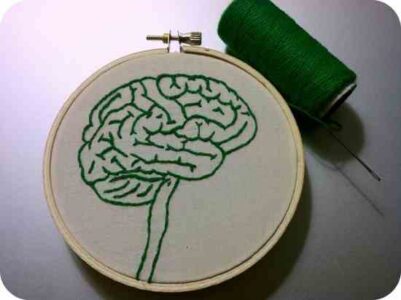By studying the human brain–not via an MRI or CT scan, but through the hands-on examination of a brain extracted from a recently deceased body–medical researchers can make stunning headway in discovering treatments or cures for diseases like autism, Parkinson’s, and Alzheimer’s. In theory, most people want to help advance this research; in reality, the idea of donating your brain to science is knottier.
Olivia Solon, writing for Wired.co.uk, explains the importance of brain donation but also recognizes its complexities: “The researchers trying to develop treatments for these devastating diseases are unable to carry out their studies at the rate they might like to because of a lack of donated brain tissue. This is partly due to a lack of awareness, but partly due to squeamishness and a belief that brain tissue is somehow more special or sacred than other organs. That strange gelatinous mass is inextricably linked to our personalities and, for some faiths, the soul.”
Many brain banks sympathize with the existential questions that surround brain donation, specifically whether it is compatible with one’s religious beliefs. The Autism Research Foundation offers snapshots of different faiths’ philosophies about postmortem brain tissue donation in an effort to make potential donors’ decisions easier:
Buddhism: The Buddhists believe that the decision to donate organs and tissue is a matter of conscience. While there is no written resolution on the issue, Reverend Gyomay Masao, president and founder of the Buddhist Temple of Chicago, says “We honor those people who donate their bodies and organs to the advancement of medical science and to saving lives.”
Catholicism: The Catholic Church has long supported organ and tissue donation. The consent to donate is seen as an act of charity, fraternal love, and self sacrifice. On the other hand, organ and tissue donation is not considered to be an obligation. For this reason, the free and informed consent of the donor of donor’s family is imperative….
Hinduism: Hindus are not prohibited by religious law from donating their organs according to the Hindu Temple Society of North America. This act is an individual decision.
Judaism: Judaism teaches that all humans are created in the image of God and that every dignity must be extended to the human body in death as in life. Consequently, Jewish law sanctions the performance of autopsies only in certain, very limited circumstances…. A more liberal precedent, followed by many of today’s Jewish leaders, was set during the last century by Rabbi Jacob Ettlinger…. He ruled that an autopsy may be performed if the deceased had willed his or her body for that purpose while still alive. In fact, once of the major provisions of the Israeli legislature’s Anatomy and Physiology Act contends that if a person specifies in writing that his or her body should be used for science, it is permissible to donate that body for medical instruction and research.
Islamic Society: The Moslem Religious Council initially rejected organ donation by followers of Islam in 1983, but has since reversed its position provided that donors consent in writing in advance.
Protestantism: While no one can speak for Protestant Christianity, because of the diversity of traditions and the lack of a single teaching authority, most denominations both endorse and encourage organ and tissue donations. At the same time they stress respect for the individual conscience and a person’s right to make decisions regarding his or her own body.
If you’re able to get over the spiritual ramifications (and the ick factor) of brain donation but think your average, standard-issue brain isn’t of use, researchers want you to know that brains do not need to be diseased to be scientifically useful. In fact, healthy brains are vital for medical research, and they are in short supply. In the UK Brain Bank’s Parkinson’s study, for example, currently only 117 of the 1,110 brains are normal specimens, Solon says.
Beyond studying what can go wrong in the brain, healthy brains enable scientists to see what can go right. In the SuperAging study conducted at Northwestern University, the cognitively sharp participants–all of whom are over the age of 80 and have maintained superior memory and IQ–are asked to contemplate brain donation, reports Kara Spak in the Chicago Sun-Times. “They commit to brain donation so at the time of death we can see if [their brains are] resistant to age-related pathology,” says assistant research professor Emily Rogalski.
For individuals who want to donate their brains for medical research, special steps must be taken. Even if you’re an organ donor, your brain will not be utilized for research that could potentially affect thousands of lives; only transplantable organs, tissue, and blood are covered by checking the “organ donor” box on your driver’s license application.
Ready to consider donating your brain for the greater good? Visit the International Brain Banking Network, the Harvard Brain Bank, the Alzheimer’s Disease Center, the Stanford Center for Narcolepsy, the New York Brain Bank, or other online resources to get started with questionnaires and consent forms. I just took the first step to donate my unremarkable brain (I’ll never know if they reject it), and I encourage you to do the same.
Sources: Wired.co.uk, Chicago Sun-Times
Image by Spec-ta-cles, licensed under Creative Commons.
Margret Aldrich is an associate editor at Utne Reader. Follow her on Twitter at @mmaldrich.


